#it's also the strict adherence to his personal code and the politeness and the never denying or looking away from the things he's done
Explore tagged Tumblr posts
Text
Hmm.
So, normally when I draw, I put something to play on my one computer screen while I have my references up on the other, as a form of background noise. I find music too distracting and I rarely watch anything with real humans in it, so it's usually an animated series I'm very familiar with -- FMA:B, Inuyasha, certain arcs of Bleach or Naruto, Uchuu Senkan Yamato, Death Note, Winx, W.I.T.C.H., etc. -- so that it's entertainment but not to the point of distraction.
I decided to go with FMA:B while working on this recent batch of commissions, as it has the additional perks of, one, being pretty much the only dub that has my approval (thus being extra less distracting by virtue of my not having to glance at subtitles now and then), and two, I've been toying with finally cosplaying from it this coming year and wanted a quick refresher. I'm not the best at math, true, but the possibility that my hyperfixation would abruptly jump tracks from one fandom to another didn't even occur to me because, come on, it's FMA:B, I've watched it a million times.
... I may have miscalculated 😔
#my sincerest apologies to my sas//osaku peeps#still working on the fic but next chapter is taking slightly longer than anticipated because of this snag#my attention is still on a man who has levelled nations but alas. it's not the red headed puppet man.#god i had forgotten how much i adore kimb//lee#he used to tie in first place easily with gre//ed but ngl the older i get#the more firmly mr. crimson alchemist is in the no. 1 spot and the gap between spots is rapidly growing#what can i say it's the rationality. he's the sanest person around. he's so sane it comes across as insane. it's beautiful.#it's also the strict adherence to his personal code and the politeness and the never denying or looking away from the things he's done#also how graceful he is about his own defeat and death#OH and how he takes honest pleasure in seeing his opponents grow and succeed#man i could go on and on i'm so firmly in kim//blee-land rn but i'll stop there#gotta go wash some dishes. brush my teeth. daydream about my military uniform.#(yes okay there's no point fighting it. i love his personal style but lbr the ish//val flashbacks are my fave part of the story so.)#(military uniform!kimb//lee it is. aj;ldskfjldkfj i'm so excited tbh i can't wait)#withoutwords
1 note
·
View note
Text
The Dance - A War of Choice
When gauging the causes of the Dance of the Dragons one has too considered which side had a choice to go to war. The war’s destructive effects on Westeros and House Targaryen’s power and dragons were the result of the conflict and thus the fault for this lay upon the ones who started this conflict. The fault for this war lays squarely on the Greens, the Hightowers and their branch of the Targaryen’s. They made the decision to contest the succession and usurp the throne, a decision that predated Viserys’ death by decades as seen by Otto’s attempt to de-legitimize Rhaenyra once Aegon was born. They did this without provocation or threat by Rhaenyra and the Blacks, and they violated the oaths sworn to support Rhaenyra’s succession and arguably committed treason against Viserys I. This was then followed by the murder of Prince Lucerys which was the end of any hope for reproachment. The Blacks in short were forced into a war for their very survival, the Greens were untrustworthy ambitious and violent and the politics of the time ensured if a conflict began it would be total.
The feudal world was not characterized by strict adherence to legal codes but a complex mixture of relationship and tradition. Poltitics in this area was extremely personal dependent on the personalities and reputations of the princes and lords involved. Family, oaths and reputation were one of the few things that could restrain the powerful nobility and thus the willful breaking of oaths was not a personal slight but the political equivalent of fraud or embezzlement. It rendered the perpetrator untrustworthy and compromised, as seen with Jamie Lannister who broke his oath to protect the King and was disgraced and disreputable. This ultimately meant that the Greens were, through their coup, guilty of multiple instances of oath-breaking to Viserys and to Rhaenyra and quite possibly various forms of blasphemy due to the religious nature of many of these oaths. It also meant that any promise the Greens made to Rhaenyra and the Blacks was worthless, as the Greens had lied and broken sacred oaths, deliberately and deceitfully. Whether as a group or individually the Greens could not be trusted.
This is further exasperated by the political and economic features of the medieval world. Remember how politics was inherently personal? Even if the Blacks acquiesced to the Green the mere existence of their bloodline creates a claim on the throne and a rallying point for dissent. Every accident or disaster would cause some to speak of the Greens as thieves and cursed by the gods. Every lord dispossessed, every lost legal case and every insult and every injury would create opposition that would either gather around the Blacks on Dragonstone or undermine the power of the Green’s in King’s Landing. The inevitable result of this would be an attempt by the Greens to arrest or execute or destroy the Blacks in their entirety to remove any possible opposition or alternative to their rule. It also meant the Blacks would be forever at risk of assassination and assault by the Greens, their allies and minions.
Now in the show Otto Hightower makes the claim that Alicent’s children will be threatened by Rhaenyra on her assent but this is an obvious lie. One of the greatest taboos of the medieval world or any premodern era was kin-slaying, one can point to multiples of myths like Oedipus Rex, Orestes, Tantalus and Hercules to see the divine condemnation and in the medieval era itself you had instances like Prince John of England who repeatedly betrayed his brother King Richard the Lionheart but was left alive and free. The key thing here is Rhaenyra was never going to turn on her half-brothers and sisters unless they declared war on her. In Martin’s text multiple Targaryen monarchs came to the throne with relatives sometimes with better claims and in none of those situations did the newly ascended monarch kill those relations. When Aenys came to throne he let his brother Maegor alive, when Jahaerys became king, he had an older sister and her daughters which as per the Law of the Andals should have been the true heirs but once again he did not imprison or kill them. After the Dance the future Viserys II would serve as regent and hand and advisor to his brother’s sons and would only claim the throne after they had died. When Daeron the Good became king, he had two half-brothers Daemon Blackfyre and Aegor Bittersteel who represented a serious danger to his reign but he left them alive and free and only moved against them when they plotted and led a rebellion against him. Even Maegor the Cruel who usurped his nephews and nieces refused to kill them until Prince Aegon and Prince Jahaerys rebelled against him. The key thing here is that no Targaryen king executed or killed their relations save in cases of rebellion; Alicent’s children would have been safe if they had remained loyal.
Finally, the murder of Prince Lucerys by Prince Aemond ensured no peace was possible and served as the final and complete declaration of war. It crystalized every fear the Blacks had that they would not be left in peace, that any oath sworn by the Greens would be broken and no crime was beyond them. I wish to be clear Aemond murdered Lucerys, the show’s scenario would be utterly unbelievable and Aemond had clearly escalated the situation continuously, threating Lucerys with violence and maiming, pursuing him from Storm’s End, pursuing Lucerys into a raging storm, and finally hunting him down into the cliffs by the sea. Lucerys was well within his rights to defend himself from attack and had fled, when possible, Aemond is a murder and no one would believe otherwise. Except Lucerys was not just Rhaenyra’s son he was Aemond’s nephew and an envoy. Aemond was thus a kin-slayer and only slightly less criminal than a breaker of guest-right. Envoys were also nearly sacred with entire wars being started when envoys or ambassadors were dis-respected attacked maimed or killed. Killing envoys was an attack on the means of peace, of negotiation, and an indirect attack on the reputation and power of their prince. Aemond’s slaying of Lucerys meant the Blacks would never and could never trust the Greens and had reason to fear for their lives in the Greens remained on the Iron throne.
13 notes
·
View notes
Text
An analysis of Iori and his character arc

Iori has a particularly interesting position in 02′s narrative (and, even more widely so, in perhaps all of both Adventure and 02) in that his base profile is rather unusual-looking even from the get-go -- the youngest child in both groups, yet with a (seemingly) mature demeanor that surpasses even his seniors. On top of that, Iori ends up having a very deep relation to 02′s themes and plot itself in a way that isn’t initially apparent, but actually makes him a very vital centerpiece of 02′s story.

Before we get into Iori’s role in 02′s actual plot, it needs to be established that a very, very large amount of Iori’s character is heavily shaped by his family background and upbringing. Prior to the start of the series, the Hida family had a large void in it, with Iori’s father Hiroki having been killed in the line of duty. Being a mere five-year-old child who had lost his father barely into actually being sentient and basically had to live the following three years going off hearsay on what he was actually like, Iori ends up raised by his mother Fumiko and his paternal grandfather Chikara.
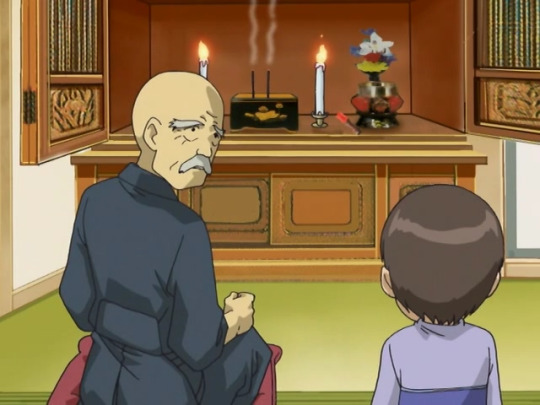

While not in exactly the same way as the Takenouchi family (which is literally working in cultural preservation and study), the Hida family is very traditionalist Japanese -- Fumiko makes traditional Japanese food and snacks like kanpyoumaki and ohagi, and a lot of attention is given to the butsudan altar in their house where they honor the late Hiroki (also note the tatami flooring). That, combined with Chikara’s naturally strict personality, led to Iori being raised with “very strict manners”, and by a set of very firm guidelines on honor, respect, and the like.
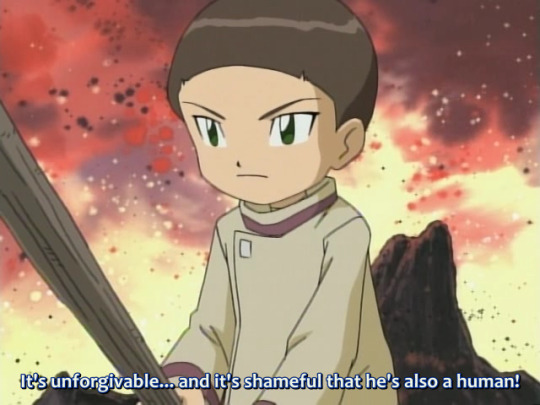
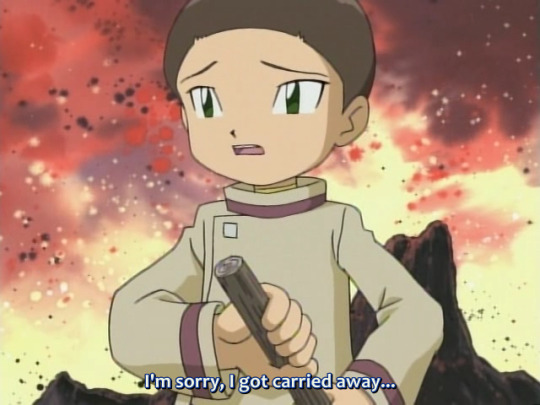
Having been raised into this kind of formality, Iori speaks almost exclusively in polite-form Japanese. This happens to initially make him come off a bit like Koushirou -- likely a deliberate parallel, given the Knowledge connection between the two (being the kind of person who admits that you don’t know everything and wants to know more requires a bit of humility, after all). That said, Iori’s way of doing this has some key differences from Koushirou:
Unlike Koushirou, who was largely polite out of an attempt to keep distance from everyone and thus had a streak of being somewhat non-confrontational, Iori is perfectly willing to say harsh or critical things -- in other words, his way of speaking is formal, but it’s not necessarily polite, and in fact Iori is probably the single most passive-aggressive person in this cast. He has absolutely no qualms about dunking on whatever he feels truly deserves the dunking, and he’ll certainly do it with a lot of grace, but he is very capable of being extremely cold when he wants to be.
Koushirou stuck to formality out of detachment and intimidation, to the point that, as per Adventure episodes 38 and 54, he was compulsively unable to bring himself to speak casually unless he forced himself. Iori, on the other hand, often “slips” -- on top of willingly defaulting to casual form whenever he’s talking to himself or (occasionally) to the Digimon (who are outside Japanese levels of propriety), he also has a tendency to start using casual form whenever he gets particularly emotionally compromised. (While it doesn’t quite come off in the translation, the above screenshots from 02 episode 10 are an example of this, with Iori losing his temper at the Kaiser and slipping into casual form -- and a bit of fun foreshadowing, guess who’s the one to successfully calm him down? Takeru. Remember this for later.) In other words, Iori’s formality is not compulsive, but a conscious thing he tries to maintain as he holds himself to high standards, and is unable to completely uphold during times his emotions get the better of him.
Ultimately, Iori may come off as “mature and composed”, but he’s still an impressionable nine-year-old child, who’s effectively parroting the rules his grandfather instilled in him because he sees it as The One and Only Guide to Living Life. In trying to figure out the right thing to do in any situation, Iori ends up constantly trying to fall back on “this is the right way to do things!” and taking it rather badly whenever things start falling outside of the expected pattern. Despite being the one responsible for Iori’s tightly principled life to begin with, even Chikara himself comments that Iori’s not being flexible enough in his thinking in 02 episode 5 -- because it’s not like he’s expecting Iori to be like this, but Iori is simply having a hard time applying these principles practically when he’s working with the limited range of being a nine-year-old child.

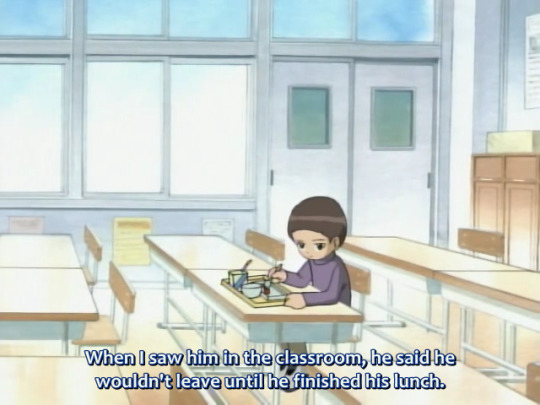
And as much as it may be tempting to see Iori as stoic, watching his expressions and way of emoting throughout the series, he does very much have the full range of emotions and curiosity and even cheer of a nine-year-old child -- it’s that he’s just constantly holding himself back for the sake of being principled and well-mannered. This has the unfortunate side effect that Iori is, as the Animation Chronicle calls it, “clumsy at expressing himself as a child”. Because he’s constantly restraining himself like this, he has a hard time expressing himself or letting himself enjoy things in the way a normal child would.
It also goes a long way in explaining why Iori is never seen hanging out with any other peers his age, and is exclusively depicted in the company of either the rest of the 02 group, or his own family. While part of it is simply because (as per Japanese school procedure) he’s too young to be formally enrolled in any clubs, 02 episode 3 goes out of its way to show Iori being left alone in the classroom with only a teacher stuck supervising him, as he tries to force himself to finish his lunch due to his stubborn adherence to principle (even though he seems to hate tomatoes). In other words, it’s heavily implied that Iori’s own behavior ended up isolating him from his peers. Considering that the 02 group is generally made up of kids who are socially displaced in some way, it naturally follows that, despite being significantly older than him, they end up welcoming him into their friend circle and treating him as an equal.
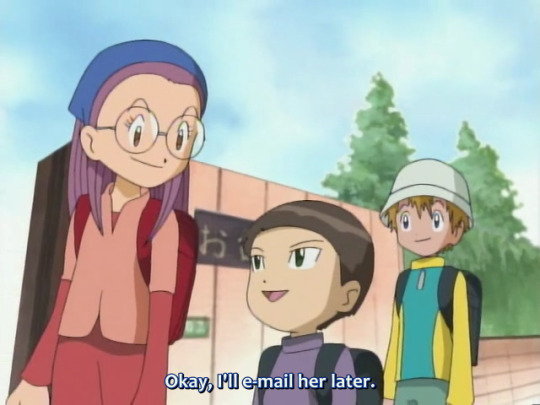
When the series starts, Miyako and Iori seem to have gotten a certain degree of closeness (with Iori as one of the only people Miyako drops honorifics on). It stands to reason that Miyako, being open-minded towards people and rather aggressively friendly, would be willing to befriend her neighbor despite the three-year age gap between them, and so they already seem to have developed a rapport where Miyako’s willing to come over to his place to help work on the Hida family electronics in exchange for food.

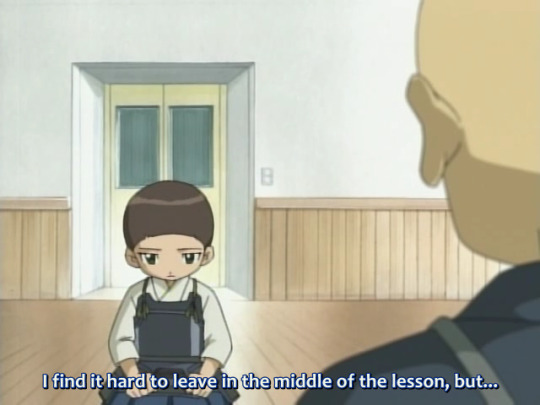
So, you know, this and that happens, Iori becomes a Chosen Child, and this is the start of where Iori’s “principles” start coming into conflict with each other. The nature of the Digital World crisis is a no-brainer -- the Kaiser is doing terrible things, and Iori’s just been given the tools to do something about it, and so for him, upholding his principles to do the right thing means proactively doing something about it. But getting involved in this territory war will mean “fighting and hurting other people” (bad) and “hiding things from his family and sacrificing obligations to them” (also bad). Chikara advises him in 02 episode 5 that he still needs to be the one to decide what he wants and needs to do at any given moment, but it’s clear that this is still a new concept for Iori to swallow.
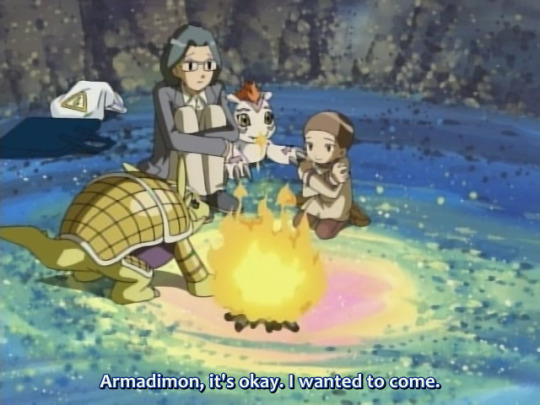
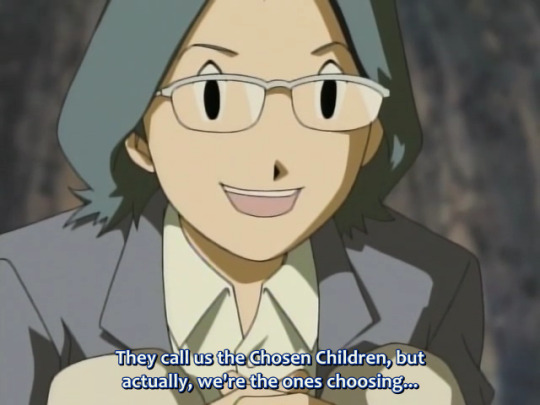
It’s also important that 02 episode 5 is also the episode that introduces Jou, who very much understood the dissonance between “adhering to principles in spite of how practical that may not actually be”, which means the two of them end up bonding over...ditching real-life obligations to come to the Digital World. This bonding happens despite the fact that they have the largest age gap out of any two given kids out of the Adventure and 02 group (Jou is 15, and Iori 9) -- and yet, they’re able to bond over being like-minded like this. And while they come from different contexts, there’s also a parallel drawn between the two on “the importance of personal choice” -- because back in Adventure, Jou’s story involved channeling his desire to help others in a way different from his usual expected path as a doctor or as a Chosen Child, and, likewise, it will be up to Iori to find his own way towards what he thinks is right.


Iori’s “adherence to principles” also needs to be distinguished from Jou’s in that Jou was someone more likely to be stuck to “practical” rules (one might call him Lawful) such as waiting for adults to help them with things, or what to put on eggs. Iori, on the other hand, has self-enforced rules that are far more ideological -- he doesn’t actually care that much about institutionally-enforced rules (note how he has absolutely no issue with sneaking into school with his friends in 02 episode 6) as much as he enforces a moral code on himself about “the right thing to do”. For instance, that he has to show his respect to Jou by formally finishing his introduction, even if it’s clear they know each other by now already.
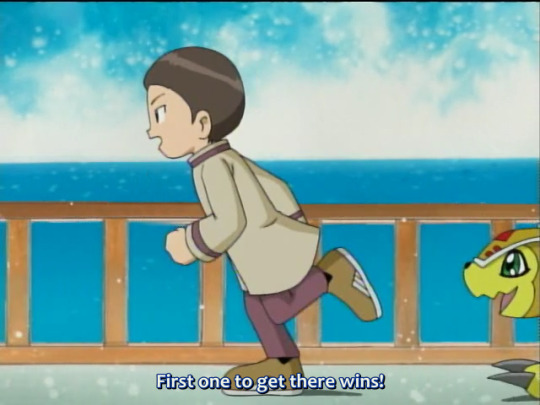



But, again, it bears repeating: Iori is a nine-year-old child. The rest of the kids respect him enough to not treat him like a younger child -- other than a brief moment of emotional compromise that Daisuke quickly apologized for, the group is never really depicted as paying particular mind or care to the fact that Iori is so much younger than them, and for the most part treat him like an equal. But Iori himself is conscious of this -- after all, it’s why he’s constantly speaking politely to everyone all of the time, but 02 episode 16 also implies he’s very self-conscious about this. The plot of the episode kicks off when Iori momentarily gets caught up in his excitement about potentially getting a new Digimental, and, once things start going south, he starts blaming himself for causing all of this and lashing out at the others for (at least, in his mind) singling him out to be the one to escape on the grounds of being the youngest. After all is said and done with the incident, Submarimon lets Iori have a moment of something Iori really does need: a bit of a chance to actually get to enjoy himself as a young child instead of restraining himself so much.

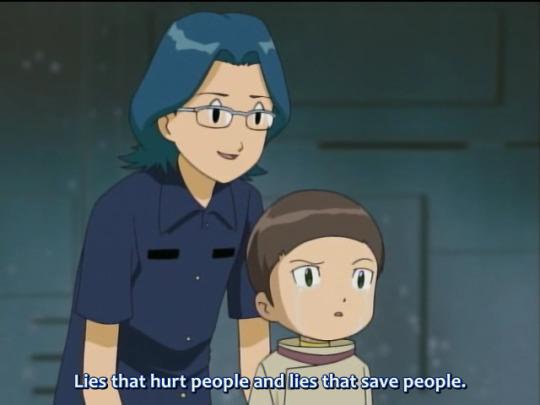
Speaking of 02 episode 16, this is also where we first get to see how the pressure of maintaining Iori’s moral code starts to emotionally tear at him. It’s the first time we see Iori lose his composure this much. To everyone else here (and, perhaps, the audience, to some degree), Iori’s making a mountain out of a molehill -- he’s calling himself an unworthy person for telling a lie that even Jou himself clearly didn’t mind. But remember, Iori is someone who’s still learning a lot about how the world works at such a young age and is inclined by default to fall back on whatever his grandfather’s told him (to a point that even said grandfather considers to be overdoing it). Right now, Iori has basically built his entire view of morality based on this kind of thing, so putting a dent on it is like encouraging a slippery slope of potentially falling into moral depravity.
The reason why I say Iori’s character arc has a lot to do with Adventure and 02’s storytelling itself is that it’s a surprisingly pragmatic series when it comes down to it -- “it’s okay to lie, sometimes” is not exactly the kind of moral you’d expect out of your average kids’ show, but, perhaps a bit unusually, this series prefers to skip all of the preachiness and focus on pragmatics. (After all, back in Adventure, a lot of the final arc revolved around the question of “is fighting the right thing to do when there might be casualties?”, with the probably-kind-of-uncomfortable-but-frankly-very-practical answer of “it certainly beats having more casualties that would happen if you sat around and did nothing.”) Iori’s character arc is, effectively, this in a nutshell -- what’s the “right” thing to do when following principles alone doesn’t seem to be doing it? In the end, both Adventure and 02 are big on this -- preachy words and moralistic principles mean nothing in the face of striving to practically minimize damage and help others.
And so, Jou -- who himself grappled quite a bit with the dissonance between principles and pragmatism back in Adventure -- is the one to successfully reframe it in a way that Iori understands: most of all, Iori doesn’t want to see people get hurt, and whether “lying” or “not lying” is the right thing to do is not as relevant as “whether people are getting hurt”. Iori not lying would have caused a great deal more of hurt than lying, and it’s through understanding this kind of principle that Iori accepts that he still has a long way to go in terms of exercising his duty to others. The secondary Digimental arcs have a heavy theme of “acknowledging your deficiencies and resolving to improve”, and in the case of Iori and the Digimental of (this thing has been translated half a dozen ways, but, effectively, honoring your obligations to others), it involves his first major moment of coming to terms with the idea that the principles on paper he’s been stubbornly following aren’t going to do it by themselves.

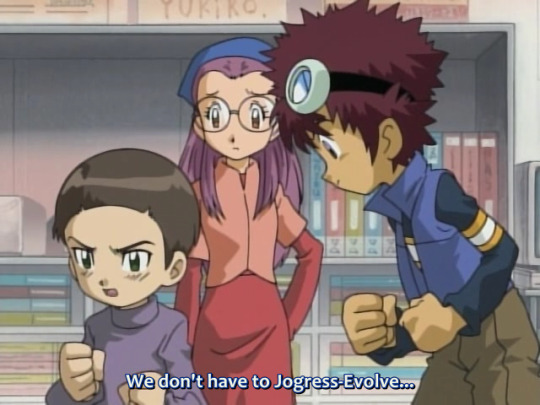
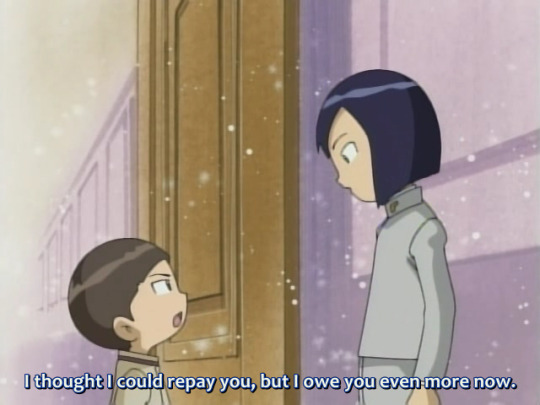
Once the Kaiser arc concludes and the group is posed with the question on how to handle Ichijouji Ken, Iori’s reaction to him is the most infamously extreme: Ken is a Bad Person who is completely beyond forgiveness, and Iori wants nothing to do with him. It probably needs to be made clear that Iori’s stance on not wanting to forgive Ken is not inherently unreasonable. Ken really did some awful, horrible things in the first half of the series, and it is completely within Iori’s rights to decide that he doesn’t want to forgive or like Ken thereafter.
The part where Iori’s behavior starts posing issues is not the part about whether he likes Ken or not, but rather that Iori gets so hung up on that lack of forgiveness that he becomes very bad at observing the practical reality in front of him. Or, in other words, Iori gets so fixated on the principle of what happened in the past that he’s unable to make good judgment calls on what should happen going forward. It is abundantly clear to everyone by (at the latest) 02 episode 26 that Ken is not going to easily lapse back into his old ways and would like to make an effort to repair the damage he caused; regardless of whether they like him or not, it’s in their best interest to cooperate with him and let him help out (and even keep an eye on him to make sure bad things don’t happen again!), especially when the factor of Jogress comes into play and turns out to be a very valuable asset in the fight ahead. But Iori has a a rather squeamish, petty response when he tries to claim that they shouldn’t need Jogress (in the midst of everyone else being excited about the possibilities it poses, even without Ken in the equation) in 02 episode 28, and even when he does go along with everyone working with Ken in 02 episodes 28-29 during the Giga House Incident, he approaches it like he and Ken are bartering favors and that he’ll have to “repay” Ken before he can properly return to pigeonholing Ken as an Unequivocally Bad Person.

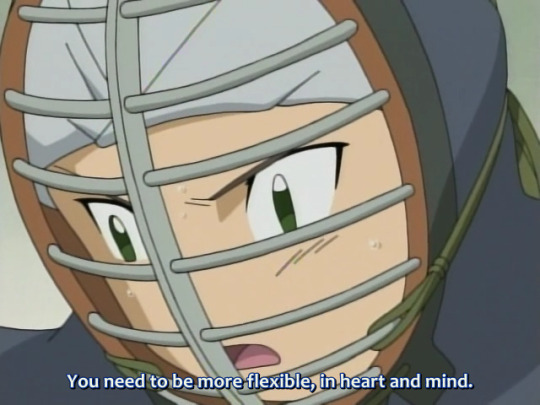
And so the issue here is: Iori being so determined to fixate on trying to stuff Ken into a neat box of a Bad Person isn’t good for himself, either, because it basically means he’s going out of his way to run pointless mental loops and maintain the feeling of stewing in a grudge against him, even when it’s helping absolutely nobody. Note the metaphor drawn when Iori practices kendo with Chikara in 02 episode 24 -- he keeps doing the same motion over and over again despite the fact it’s clearly not going anywhere, and Chikara has to warn him that doing nothing but aim for the head isn’t how you’re supposed to do it. Right now, Iori is having a hard time parsing things in ways besides shoving things in neat boxes of black-and-white morality, and this lack of flexibility is severely restricting his ability to be productive.


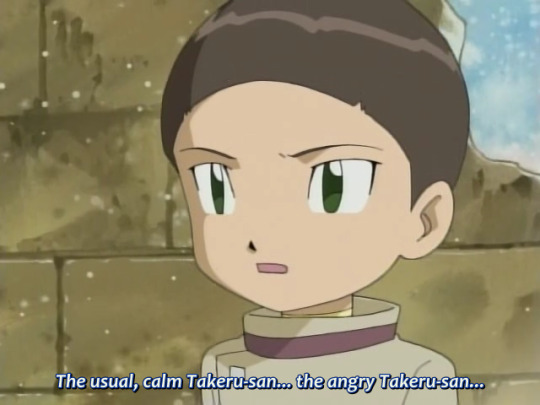
What starts to really cause Iori to make a major shift in his thinking process is none other than his connection with Takeru, a subplot that had already started kicking off all the way back in 02 episode 19, when Iori witnesses Takeru suddenly taking a violent shift in mood against the Kaiser to the point it scares him. Iori, of course, considers Takeru to be a “good" and “kind person”, but someone like that should (in his mind) logically not be making sudden, violent outbursts like that -- and especially once he starts advocating for BlackWarGreymon to potentially be killed if it comes down to it, going very against Iori’s fundamental principle that killing anything that’s sentient is unforgivably immoral.
This “contradiction” is what leads Iori to realize that he needs to do much more if he wants to understand Takeru properly, and it’s also the start of how Iori grows into the trait of his first Digimental, “Knowledge” -- or, more specifically (as defined by Koushirou in Adventure episode 24 and 02 episode 2), “curiosity and a drive to know more”. In the case of Iori, this manifests in “I want to know more about other people.” It’s Iori effectively understanding that his very limited view of the world and how people work isn’t sufficient in itself, and this concept becomes the crux of his character arc for the rest of the series.
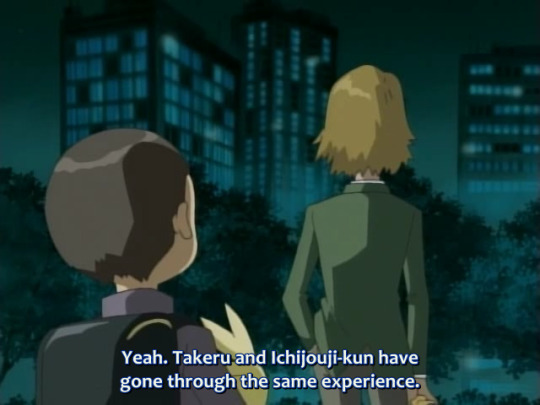
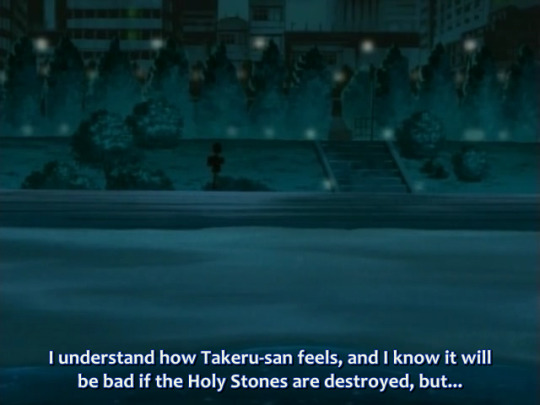
After tussling around and getting increasingly confused about Takeru’s seemingly paradoxical behavior, Iori finally goes directly to Yamato to consult him about it in 02 episode 35, and Yamato explains the backstory behind Takeru’s trauma from losing Angemon back in Adventure episode 13, as well as a reminder that as much as it may have been his own fault, Ken technically went through some pretty similar trauma, and everything that’s happened since his fall from being the Kaiser hasn’t exactly been sunshine and roses for him either. Iori reflects on this as he goes home, with the important statement attached: he understands Takeru’s feelings. He’s now able to understand why Takeru acts the way he does, not on the grounds of principles of what’s right or wrong, but based on the fact that Takeru’s simply a very messy human being who’s not handling his own tendency to suppress his emotions well.
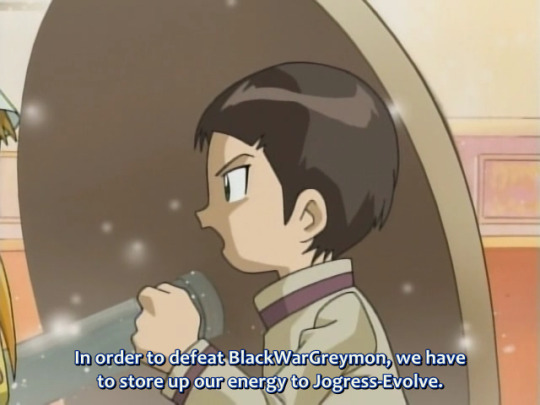
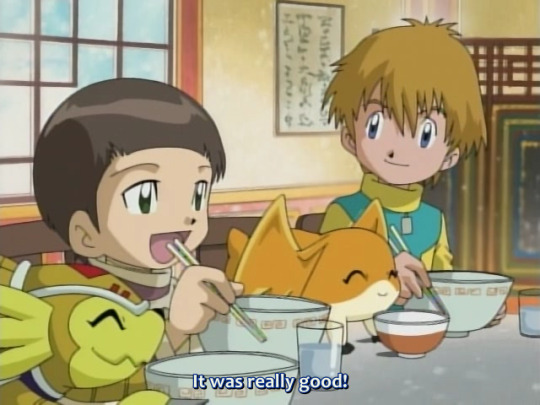

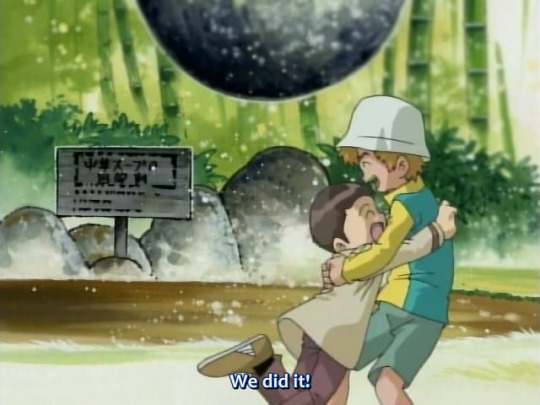
Because Takeru is such a convoluted person, and because Iori’s fundamental issue with approaching things involves unraveling some very deep-seated tendencies in his mentality, the way the two finally connect in order to properly Jogress requires something a lot more convoluted than just happening to clash in a single magical moment like Daisuke and Ken or Miyako and Hikari did. Iori starts off the episode catching himself when he’s about to fall back into “principles over practicality” again -- he starts railing on the others for (in his mind) taking the impending BlackWarGreymon fight too lightly, before Armadimon reminds him that he’s hungry, and Iori realizes -- again -- that he cannot effectively enforce “the right or wrong thing to do” without taking other people’s feelings properly into account. Realizing that this is is a barrier between him and the others, especially Takeru, Iori tries to adjust his thinking pattern and even becomes the one to advocate that everyone get some proper food and rest instead of charging into the fight unprepared.
The meal results in Iori getting yet another rare moment of letting himself truly enjoy something without restraint, and is also followed by Takeru speaking openly to him about their potential Jogress -- openly, honestly, not covering it up, not even with the same light playfulness he would usually put on (including what he had with the very same topic at the beginning of this episode). It is an acknowledgment from Takeru’s own part that he’s been watching what Iori’s doing and also wants to connect, and an open and serious statement from someone who had constantly tried to cover up everything with a smile up until that point, and, with the two reaching an understanding, they finally achieve their Jogress at the end of the episode.
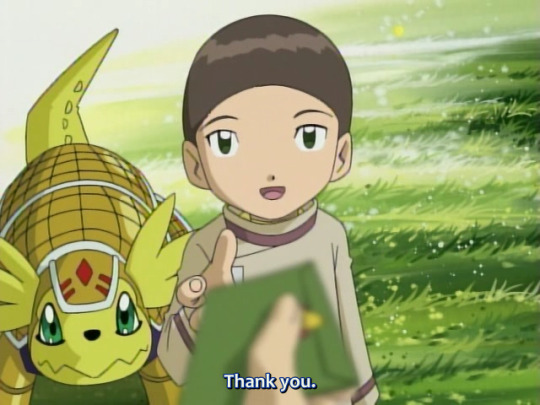
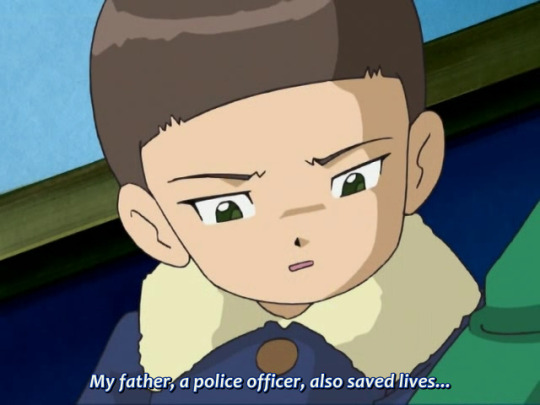
This connection with Takeru, and the understanding that came from it, is what allows Iori to start applying a bit more flexibility towards approaching other situations. 02 episode 38 has him finally accepting Ken’s invitation to his Christmas party, after so many episodes of despising so thoroughly -- because now that he’s taking Ken’s position and feelings into account, he’s able to properly recognize him as someone doing his best to make amends going forward and be friends. Later, in 02 episode 44, despite having originally been the one more staunchly against it on principle, Iori handles the shock of having to kill an enemy with somewhat more grace than Miyako does, because not only had he already started considering the difficulty of fighting an enemy that cannot be reasoned with and wants nothing but wanton destruction (back during the end of 02 episode 29), Takeru is there to remind him that their priority must, first and foremost, be “saving lives” -- like, for instance, the girl in a wheelchair in front of him.
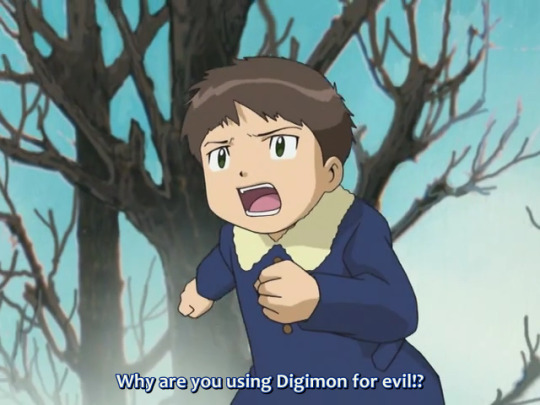
And so, the final episodes of 02 put everything Iori’s learned to the ultimate test, when he learns that the major perpetrator behind it all is none other than a friend of his departed father.
Up until this point, much of Iori’s mentality had been shaped by the rather saintlike image everyone had put up of Hiroki -- it’s almost certain that he must have had his own flaws as a person, but the resistance to speaking ill of the dead, and the generally positive influence he’d had on his friends and family and his untimely death by “protecting someone”, painted him as effectively a perfect, impossible ideal for Iori to strive to. Much of Iori’s justifications for his own behavior had consistently been reliant on “my father said this” or “would my father would have done this?”, such as his reason for forcing down his lunch in 02 episode 3, or using him as a mental model in 02 episode 44. For Iori’s former mentality of “good person” and “bad person”, this is the ultimate contradiction that threatens to rip apart everything Iori had built his own values system on -- that someone so incredible and saintlike and virtuous would be friends with someone so unambiguously doing horrible things like Oikawa. Iori, taking this as an awful emotional blow, parses this with a desperate desire to understand the motive behind why someone would do this, because it’s not enough for him to continue until he does.
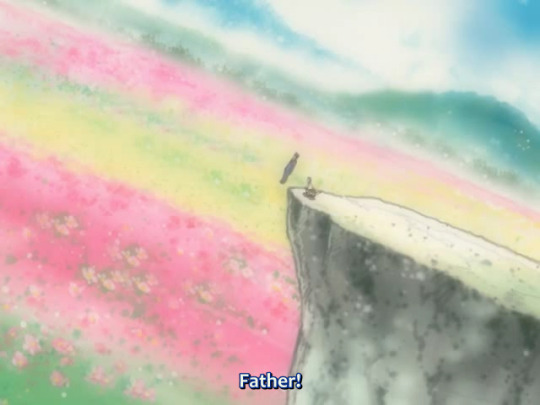
And in 02 episode 49, we see Iori effectively forced to confront the fact that he can’t keep relying on the model of his father anymore as the sole basis for his way of life when, in the end, his father will never return. Iori doesn’t even know him that well; he can’t conjure up an image of him talking, or anything beyond just a flat, serene smile. And when the image of his father finally disappears, Iori almost immediately accepts it, as if he’d known the whole time.
It’s also significant that Iori declares that what he’ll do next is introduce Armadimon to his mother -- because, in the end, Iori is at least now capable of “moving forward”. He can’t get his father back, and the best thing he can do is make use of his existing support group and keep pushing forward with the people he does have in his life -- quite the opposite of Oikawa, who responded to the loss of that exact same person by clutching onto the remnants of the past they shared, and never becoming able to move on.

Hence, 02′s finale ends on none other than Iori, and when you think about it, this is actually a pretty unusual position to be in for someone who’s not the lead protagonist (Daisuke) nor the most prominent focus of the story (Ken)! But it’s a testament to just how important Iori is to this narrative on a thematic level -- all of the struggles about the morality of fighting and the disparity between principles and practicality (which dated all the way back to Adventure), and 02′s prominent theme of coping with loss and regrets and figuring out how to best move on, are all tightly entwined with the character arc of this nine-year-old child. (If you want to take the parallel between the Adventure narrative and Iori even further, Iori and Armadimon sharing the same voice actress is possibly one of the most prominent ways of indicating how a Digimon partner is fundamentally meant to express one’s inner self.)
And especially since Iori is the person who should have been the most vehement about having any kind of sympathy or compassion towards Oikawa -- just remember how determined he was to be cold towards Ken only half a series ago! -- and it leaves a strong impression of the huge, huge journey Iori had gone on through this series. Iori’s arc closes on him understanding the nature of what Oikawa had wanted this whole time, and understanding exactly what it meant for him to make that sacrifice right after finally meeting his partner, and ends the story the most emotionally affected by it -- because, after all, that’s the sort of truly kind person Iori is.
Iori after 02
By the time of Spring 2003, when Iori’s had some time to reflect on it, we learn from Iori that he still does not forgive Oikawa. That in itself is fine; remember, Iori is perfectly within his rights to not do so after all that he’s done. However, again, a distinction must be drawn between whether Iori forgives him, and whether he still considers it to be important to understand the mentality behind why Oikawa did what he did, and to reflect meaningfully on that instead of running himself in circles fixating on a grudge. Again, it’s about going forward with what he knows and has, instead of getting fixated on past deeds -- and with that, Iori resolves to “study”.
In The Door to Summer, we also learn that Iori allegedly has a “girlfriend” -- or, at least, someone Daisuke calls his girlfriend (Daisuke is a bit of an unreliable narrator here, given he’s also totally blown Hikari’s “rejection” of his beach hangout offer up as if it were a full-on total rejection of him completely). It is, perhaps, interesting that Daisuke is capable of getting this impression about Iori’s relationship with someone outside the 02 group, given that he’d been rather isolated from his peers all the way back in 02 episode 3...
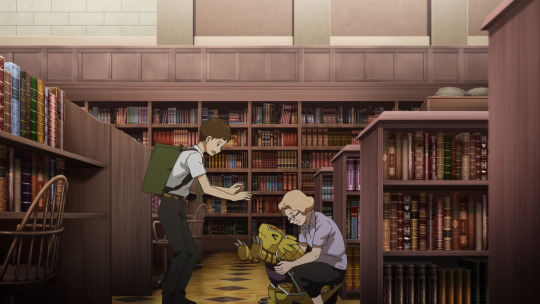
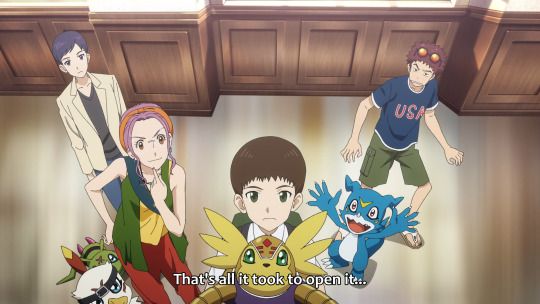
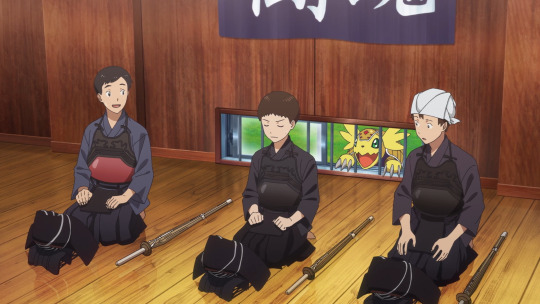
Iori occupies an interesting position in Kizuna, because we only have one point in time where we got to intimately know him, and that was back when he was only nine years old -- and between that and Kizuna, there is a massive eight-year timeskip. He's 17 now, and we don't get any kind of catch-up period in the middle like we did with Takeru and Hikari in 02, and that is a time period where a lot of changes in demeanor could have happened with him compared to all of the others.
At first glance, it seems that he’s gotten much more stoic -- but this is actually something that should reasonably be expected, because now that he’s a teenager, it stands to reason that he would be much better at actually controlling his emotions and not necessarily get overwhelmed as easily. Plus, it’s not like he’s shown to be completely emotionless throughout the movie; he’s just doing a much more graceful job of holding himself back (look carefully at the credits and you can see him sweatdropping at Armadimon barging in on his practice), and moreover you can still see him deliver some pretty direct bluntness about the ramen in New York. Still with formal language, but nevertheless, no flattery is to be had here; Iori will dunk on you if he thinks you deserve it (even if it’s to do with mediocre ramen).
But there are some other interesting observations -- for one, the official website profile states that he’s actually settled on his future career in law at this point, and has made himself extremely busy in order to do so. (On top of that, he at least seems to be on friendly enough terms with his peers at school that they’re happy to greet him on their way out.) The drama CD indicates that Daisuke considers him the busiest out of the entire 02 group -- yet he and Takeru went out of their way to pick him up from school, because he’s that important to them. (Think about it -- how often do you see university students going this far to go retrieve a high school kid to hang out with them?) And likewise, Iori doesn’t even hesitate to state that he’ll make time for them, and throughout the movie he’s conspicuously seen in his school uniform, implying he really is moving things around to make it happen, because they’re that important to him.
He also engages in the single most chaotic action from this group, which is getting Armadimon to break into Menoa’s lab. It’s not that he’d inherently been against this kind of thing before, especially for something important (recall that he’d been happy to sneak into school for Golden Week with the others back during 02 episode 6), but it does beg the question of where and how he got this information that Armadimon could break electric locks. Perhaps he’s become a bit more, ah, pragmatic of a person since 02...
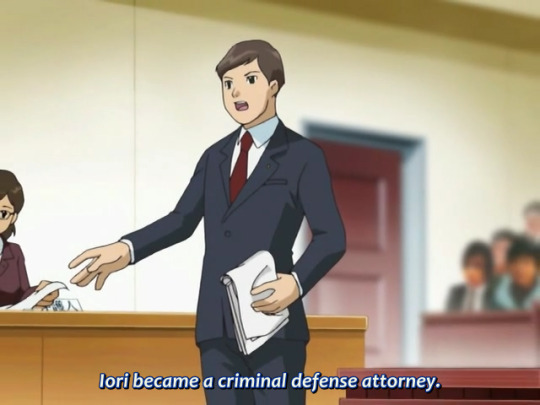
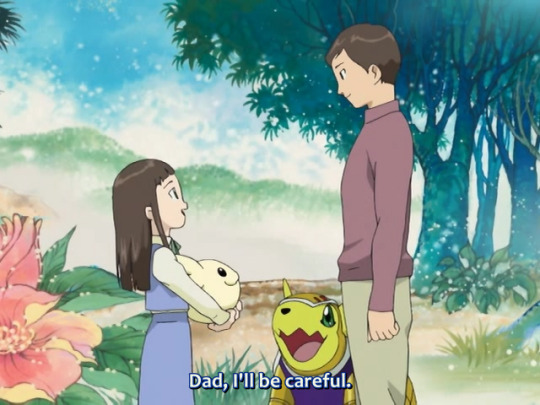
So, in the end, Iori does become an attorney, and specifically a defense attorney (the Japanese law system does draw the distinction). The person who once wanted to stick people he considered to be doing wrong into a “bad people” box and call it a day eventually came to embrace a career that involves understanding people and advocating for their perspective, or at least bargaining for something other than defaulting to the harshest assumption and a solution that allows all of the parties to best productively move forward.
He also has a daughter, who seems to have been raised to be as well-mannered and formal as he was. But, thankfully, he himself is there to help raise and guide her as she grows up.
#digimon#digimon adventure 02#digimon adventure last evolution kizuna#kizuna spoilers#hida iori#iori hida#shihameta
106 notes
·
View notes
Text
Bushido, Honour and Ghost of Tsushima
Now that I’m done crying over a horse (I WILL NEVER BE OVER THIS), let’s talk about Shimura and Sakai and the definition of honour to a samurai.
Because the story tells us that Jin has no honour and is a bad samurai but that is from the perspective of Shimura and the samurai like him. There is no good ending for Jin, not because he doesn’t have honour, but because he defied the authority structure. Basically, it’s politics.
I believe Jin is actually the one with more honour and that Shimura forsakes his own honour on the beach when he pursues a course of action that leaves Tsushima (and the mainland) open to invasion. Because without Jin’s willingness to adapt, Tsushima would have been lost, no question.
The principles of the samurai “code” - bushido - weren’t truly codified until Miyamoto Musashi wrote about the samurai class in his later years. This was in the 1600s. Ghost of Tsushima takes place in the 1200s, well before Musashi’s writings. Which is not to say that the samurai didn’t follow a code of honour but that code could vary from clan to clan, region to region. What was functionally the singular unifying factor was that the samurai were warriors and they were nobility.
Now, as we all know, the role of nobility has historically been a very divided one. There are the ruling class who believe that their job is to take care of the people and there are the selfish pricks who are rich and entitled and abuse their privilege. Now, I’m not saying that Shimura is abusing the peasants but it is made very clear that they are not his priority. His personal honour (or perception of what honour is) is more important to him than the lives of the peasants. Even the lives of his own soldiers are less important than their perceived “honour”. And Shimura makes it clear that the will of the Shogun (yaaay politics) is more important than the lives of the people. Even his own “son”.
Jin exemplifies the noble who understands that his role is to protect all of his people. He is the people’s hero because he cares about them. He earns their respect and loyalty in a way Shimura cannot because Shimura sees them only as subjects to rule over, not people to care about.
Further, in the game, Jin does some very “ninja” things. Using poison, assassinating, attacking from behind etcetera. Well. The shinobi as a class didn’t really come into being until the Sengoku era (around the late 1400s, early 1500s). So the criticism levied on Jin for his dishonourable behaviour is somewhat amusing because while samurai did have a general belief that assassination was dishonourable and that you should meet your foes on the field of battle face-to-face, they weren’t opposed to using non-conventional tactics to win battles. They just didn’t get their own hands dirty with it.
Now, if we were to talk about the principles of bushido as they have been interpreted through Musashi, there are nine principles by which a samurai should live his life:
1. Do not think dishonestly. 2. The Way is in training. 3. Become acquainted with every art. 4. Know the Ways of all professions 5. Distinguish between gain and loss in worldly matters. 6. Develop an intuitive judgement and understanding for everything. 7. Perceive those things which cannot be seen. 8. Pay attention even to trifles. 9. Do nothing which is of no use.
These are the principles that were later further reimagined as the eight virtues of bushido by Nitobe Inazo in the 1800s and are what most people see in reference to bushido today:
Righteousness (義, gi) Be acutely honest throughout your dealings with all people. Believe in justice, not from other people, but from yourself. To the true warrior, all points of view are deeply considered regarding honesty, justice and integrity. Warriors make a full commitment to their decisions.
Heroic Courage (勇, yū) Hiding like a turtle in a shell is not living at all. A true warrior must have heroic courage. It is absolutely risky. It is living life completely, fully and wonderfully. Heroic courage is not blind. It is intelligent and strong.
Benevolence, Compassion (仁, jin) Through intense training and hard work the true warrior becomes quick and strong. They are not as most people. They develop a power that must be used for good. They have compassion. They help their fellow men at every opportunity. If an opportunity does not arise, they go out of their way to find one.
Respect (礼, rei) True warriors have no reason to be cruel. They do not need to prove their strength. Warriors are not only respected for their strength in battle, but also by their dealings with others. The true strength of a warrior becomes apparent during difficult times.
Honesty (誠, makoto) When warriors say that they will perform an action, it is as good as done. Nothing will stop them from completing what they say they will do. They do not have to 'give their word'. They do not have to 'promise'. Speaking and doing are the same action.
Honour (名誉, meiyo) Warriors have only one judge of honor and character, and this is themselves. Decisions they make and how these decisions are carried out are a reflection of who they truly are. You cannot hide from yourself.
Duty and Loyalty (忠義, chūgi) Warriors are responsible for everything that they have done and everything that they have said and all of the consequences that follow. They are immensely loyal to all of those in their care. To everyone that they are responsible for, they remain fiercely true.
Self-Control (自制, jisei)
Now if we look at either of these lists, we can see that Jin does not lack in honour. He does not stray from the path of the samurai. Quite the opposite, Jin exhibits exemplary personal responsibility. Shimura, on the other hand, while not without honour and generally consistent with Musashi’s guidelines, does stray far afield of the virtues. In fact, I would argue that his strict adherence to the “rules” as he perceived them is actually what makes him less honourable than Jin. He cannot perceive things in any way other than the one he was raised with and that is his downfall - and nearly the downfall of Tsushima.
Which, historically is not inaccurate. (Not that you should be looking to Ghost of Tsushima for historical accuracy. In fact, please don’t... XD) During the actual mongol invasion of Japan, the mongols sailed from Korea and took Tsushima as well as Iki Island then proceeded to land at Hakata Bay. These islands simply did not have the number of troops sufficient to defend them against an entire fleet.
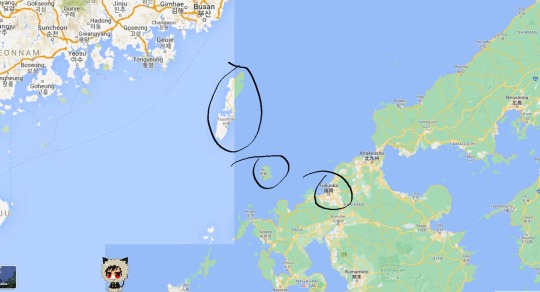
What actually defeated the mongols was not samurai honour (or Jin’s sneaky shinobi tactics). It was weather. During the battle at Hakata Bay, the mongols decided to retreat to their ships at night to avoid being ambushed by the Japanese. And because the troops were on their ships and out to sea when the tsunami hit, the mongols lost nearly half their fighting force. They retreated and, much later, planned a second invasion, following a similar path as the first. They attacked Tsushima and Iki again, routing the samurai and murdering many of the islanders. They moved against Nagato and Hakata Bay but this time the Japanese were better prepared for them and they were forced to return to Iki and other small islands. The Japanese counter attacked by launching raids on the mongol ships. As the Japanese continued to push them back, keeping them off the mainland, the mongol fleet was once again defeated, not by samurai, but by weather. A great typhoon struck the fleet and devastated it. The mongol commander fled, leaving many of his troops stranded on Taka Island where they were rounded up and killed by the Japanese. (Note this is a condensed summary of the invasions. There is obviously more detail to the actual events.)
Amusingly, what did come out of this war was a growing respect and fear for the Japanese from the Korean, Chinese and Mongol nations. The mongols, in particular were quite concerned by the Japanese swords. The Japanese, however, found that these earlier katana that they were using were inconvenient to use when fighting in close quarters against large numbers and responded by refining them.
Anyway, the history lesson aside, Jin’s story is a tragedy but it’s also an absolutely wonderful samurai story because it shows the lengths a truly honourable samurai will go to, to fulfill his duty to his principles and to his people.
#we stan jin#jin is best samurai boy#jin for Shogun 2020#give this boy a hug#and buy him some sake#I only have one regret#and that is that I didn't kill Shimura#because that's how you get the white ghost armour#and I wanted the white ghost armour#but if you let Shimura live#you get red ghost armour#which is also cool#but not as cool as white#ghost of tsushima#thoughts and feelings#bushido is fascinating#the world could use more bushido
61 notes
·
View notes
Photo







Matt Olsen Uploads The Douglas Furs Series Bible Of The Rejected Disney XD Series From 2015 All Art Belongs To Jesse Ledoux
Matt Olsen from Sly Cooper fame & co-creator of Douglas Furs uploaded in his website the series bible of the Douglas Furs a rejected Disney show for Disney XD who sadly was rejected.
The Douglas Furs is an original cartoon series about a community of animals living together in Douglas, an otherwise unpopulated corner of the deep forest Pacific NW. Though they hold down jobs, use complex machinery, and return their library books late, they still remain animals. It’s like William Shakespeare said, “A bear will always be a bear, even if he’s wearing overalls.”
Characters Names
Barry The Bear: Optimistic Bear with a big heart and that fixes all the problems,supports Douglas to the absolute max, innocence and naivete are components of Barry’s character, he’s no wide-eyed child, speechless and dreamy in the presence of wonder. Quite the contrary! Barry is a loud, active celebrator of every new experience. He loves life! Even the most normal, everyday things can get Barry excited and revved up to a surprising extreme. Though it’s also true that his rabid interest may change in an instant with the discovery of some new stimuli
Mary Margaret: Mary-Margaret attends Rutherberry Elementary, She is the Bullhorn’s star investigative journalist, a role which she takes very, very seriously. The position feeds her all-consuming curiosity, or as her peers simply call it, “being a nosy-pants”. Her efforts have single-handedly made the Bullhorn the most-read paper in Douglas, all but putting the “professional” paper, the Douglas Herald-Gazeteer, out of business. Mary-Margaret is the elementary-school age daughter of Douglas’ leading intellectuals. Her father, Myron, is a critical studies professor at the local university, while her mother, Dagmar, is Douglas’ most esteemed (and only) deep-Jungian psychiatrist.
Beverly: Beverly is the single force that keeps Douglas functioning as a city. As Deputy Lieutenant Mayor, she performs all the responsibilities of not only her own position, but also the Mayor’s and several other government officials. She’s vastly overworked but somehow manages to hold it together, fulfill all her duties and put out the fires. Sometimes, literally. (She’s also a volunteer firefighter.)
Her hectic home life does not provide much of a relief from her career. She’s happily married to Garland, who in addition to being father and primary care-giver to their children, is a semitalented landscape painter. Her six kids, three sets of twins, are all very energetic and clamor for her attention.
Viktor: Viktor was a celebrated Cosmonaut of what we would call vaguely Eastern European descent. On his final lift-off – a mission that would have sent him hurtling past Mars and Jupiter to be locked in orbit around Saturn – the rocket he was piloting failed, veered way off course and crash-landed in Douglas. (He suspects the rocket was tampered with by a jealous rival.). Since that time, his main pursuit has been to repair the rocket and resume his mission. However, due to Douglas’s non-advanced state of technological development that goal remains far outside his reach. So, he remains an unwilling resident, but he’s gradually warming up to living in the township. Maybe.
Viktor is skeptical and even paranoid of almost anything outside his world. As such, he rarely leaves his home for fear of saboteurs. He’s not against helping others, but he wants all the information first and would really prefer it if there was something in it for him, too. This is probably a holdover from his Cold War-esque training.
Rainier Somersett-Psymthe: Rainier is not only the wealthiest citizen of Douglas, he is also the town’s single-largest employer. He is the current scion of the storied Somersett-Psymthe lineage and, through no effort of his own, inherited the family business: the Silky Beast line of personal shampoos for Him and Her. Due to the hirsute nature of the population of Douglas and surrounding woodland areas, Silky Beast is in extremely high demand. Since the day-to-day running of the plant is handled by underlings, Rainier lives immune from responsibility and has plenty of free time on his hands. The main focus of Rainier’s efforts is feeding his fame. He has a continual hunger for attention and thrills to read his own exploits chronicled and discussed in the local paper. He is a strict adherent to the no such thing as bad press ideal and will perform any manner of ridiculous acts solely to guarantee his presence on the front page.
Barry and Rainier are roughly the same age and share many of the same memories of growing up in Douglas, albeit from completely different perspectives. Where Rainier lives in a gilded mansion built by his great-grandfather and passed down from Somersett-Psmythe to Somersett-Psmythe, Barry lives in a one-room yurt that he constructed himself. There’s still a bit of work to be done around the back. No one would ever consider them rivals. No one except Rainier, that is, who considers everyone his rival. It’s possible that Rainier could be envious of the simplicity of Barry’s existence and attempt to out-simplify him, but that hasn’t happened... yet.
Carl: Carl is Mary-Margaret’s classmate at Rutherberry Elementary and the staff photographer for the school’s newspaper, The Rutherberry Bullhorn. His ability to fly means that he excels at aerial photography and can get shots from many different angles. Carl is drastically near-sighted and requires a large pair of corrective lenses to approach “eagle-eyed”. With the glasses on, he can see slightly better than most of the other animals in Douglas, but without them the world is a predominately blue and green blur. In a lot of ways, Carl fits squarely into the classic “nerd” stereotype, e.g., he’s quiet, bookish, shy, a little physically awkward, etc., but he has other qualities which don’t fall so easily under that sad rubric. His parents have imbued him with a strict sense of personal responsibility, justice and honor. It’s a code of ethics that has been handed down his proud family line for ages upon ages. What Carl doesn’t realize is that he is also the subject of interest by many of the other girls at Rutherberry. Unfortunately he is too singleminded to notice their adoration, even when it is at its most blatant. He lives every single day on the verge of either making his feelings known to Mary-Margaret or giving up on her entirely
Mayor Trewfuss: Quincy Trewfuss is the oldest citizen of Douglas and has served as the town’s extremely popular mayor for an astonishing forty-two terms. With one brief exception at the beginning of his career, each of those forty-two terms have been consecutive. At the close of his first two-year term, he declined to run for re-election and happily handed the mayoralty off to someone else. Trewfuss is entirely unsuited for a life in politics. He is skittish, fearful, apprehensive, easily bewildered and opposed to any and all conflict. He lives in an eternal state of being overwhelmed. His frequent response to any crisis is to follow his natural tendencies and play possum. He literally pretends to be dead. It may have stopped fooling most folks a very long time ago but they understand that whatever calamity has come up has pushed him to the edge. So, in response, he is given time alone to regather his senses. As it turns out, it’s become a very effective tool for him. Those on the inside know that he is only a figurehead at this point. His deputy lieutenant mayor, Beverly, actually handles all the significant mayoral duties. Trewfuss reluctantly appears at ribbon cutting ceremonies, poses for photographs with civic leaders, sleeps his way through city council meetings and that’s about it. Still, he remains perpetually on the verge of a total nervous breakdown.
Link And Louie: These two live in a homemade tin roof shanty just outside Douglas, beyond the treeline. Though they attempt intimidation, the town generally regards them as more of a nuisance than a threat. Link and Louie, of course, are oblivious to this and sincerely believe they are genuinely terrifying to the regular squares. Though they’ve never revealed how they ended up around Douglas, popular opinion holds that the last town they harassed, finally had enough and chased them out in a most embarrassing fashion. This accounts for the chips on their shoulders and their “somethin’ to prove” attitudes. Link is the instigator, with Louie always willing to go along blindly with any of Link’s plans. Though he’s never been tested, it’s a safe bet that Louie is not very smart. He lets himself be talked into a lot of Link’s fairly stupid ideas, most of which involve putting himself in danger of imprisonment or bodily harm, while Link remains safely at a distance. Link consoles Louie by claiming this as an occupational hazard, their biggest fear is Gordon The Sasquatch.
Gordon: Gordon is supremely boring. His company invariably brings a slight level of discomfort to everyone he encounters. His stories are long-winded, circuitous and off-topic. He speaks in an exhausted, physically draining monotone. Still, it’s hard to say a bad word against him since he’s never done any harm to anyone. So, those he encounters will often endure the conversation out of kindness and for fear of hurting his feelings. He’s staggeringly sensitive. Now, this is not to say that he’s not without value. Gordon possesses great strength and is very tall. So tall, in fact, that his head is always out of frame or behind a tree branch or perhaps hidden by a low-hanging cloud. (The home viewer will never see his face.) Just on physical presence alone, he’s an intimidating force and may be called upon to act as anything from security to heavy lifting. In those situations, his size and strength becomes a large enough asset to overcome his crippling dullness. Even though he’s not a “true” citizen of Douglas – he camps nomadically in the woods outside town – he’s generally happy to be of service and always enjoys being around others. Gordon is also a budding folksinger and can often be found with an oversize acoustic guitar, singing his terrible songs to the ears of nature, since no one else – given fair warning – is likely to listen. Overall, he’d really like to meet some other sasquatches
Douglas is a township surrounded on all sides by dense Evergreen forest. Within this clearing is a fully-functioning community of various animals indigenous to the Pacific Northwest. The town is constructed of available materials with homes and buildings suited to each animal’s own preferences. For example, as a beaver, Beverly lives in a log cabin-esque dam on the river. Wood and stone dominate the local architecture, while brightly colored mosses, ferns, wildflowers and lichen provide the embellishments. Greens, browns, grays and blues dazzled up by pinks, yellows, oranges and purples provide the palette. Technology exists only to the level it is needed.
Since the town itself is rather small, cars were never necessary and therefore, not invented. A refrigerator, on the other hand, is an absolute necessity. I mean, how else is one expected to keep one’s salmon puffs fresh? No specific number has ever been ascribed to the population of this small town – they’re not sticklers for data gathering – but as a sort of reference to its size, here’s some semi-useful factoids:
• 1 TV channel. All of the programming is made in Douglas by Douglas for Douglas. Not surprisingly, a majority of the shows take place in Douglas. “Hot Douglas Nights” is appointment television.
• 1 fire department and 1 hospital. Accidents do happen. Of course, when they happen to cartoon characters they’re hilarious.
• 2 school districts, each with its own elementary, middle and high school. This is really only done so that the grammar teams have someone to compete with... er, I mean, with whom to compete.
• 36 square miles in area. That’s the legal US definition of a Survey Township and, by pure coincidence, a remarkably close measurement of our own township. Go figure
• 200 years old. Douglas was founded in the year 1812*. Of course, that’s by our calendar. Here, they use a completely different system to measure time. It’s like dog years, but then you have to modulate the formula for each species. It’s very complex.
#Douglas Furs#The Douglas Furs#Disney#Disney TVA#Walt Disney Television Animation#Disney Television Animation#Walt Disney TV Animation#Disney TV Animation#Disney TVA Pilots#Jesse Ledoux#Matt Olsen#Disney XD
33 notes
·
View notes
Note
Is it honestly actually possible that bad people run most of the galaxy or several galaxies? Or at least even just an entire planet? It's done in sci fi a lot. However in real life that obviously has never happened. I'm not sure how to well, begin, create the circumstances that will give them that kind of vast power and not be defeated before. Even if they are the good guys, still, can't see how they can run everything either.
Bina: Totally possible since “bad” is relative depending on you who ask. If they have a believable facade of being “good” (or if they ARE doing good....... to just the right people (such as, politicians or powerful allies who will back them up)), and if they have a lot of supporters who think they’re the good guys, then it’s super feasible that they can take control of the majority of the galaxy with very little opposition.
Heck they can even get away with people just not thinking badly of them. They don’t necessarily need supporters who think they’re the right people to have in charge. Having people be neutral towards them can also be also good enough for them to take control without anyone complaining. All they need is people not caring. People supporting them is bonus, but apathy from the common man also goes a long long way in helping bad people come into power.
In the end it’s all about controlling their narrative and their own publicity. They can be totally truly evil, but if they cover their tracks with enough propaganda and efforts to appear like they’re doing nothing wrong, or even that they’re doing things for the benefit of the people (or that they’re beneficial for powerful people who have more sway than the average person and can thus override the wills and desires of the common people), then the baddies can take power and the common man would either take no issue with it or be unable to do anything about it.
Tex: The thing about leadership is that morality doesn't really calculate into it - they're two separate areas with very little overlap, especially if a leader is a successful one. The longevity of a leader's reign has more to do with their bureaucratic competency, organizational skills, competency to set and achieve certain goals that benefit those whom they rule (in some form), and ability to manipulate people. And, I hate to break it to you, but both "good" and "bad" people are manipulative, just for different reasons.
Al Capone is a classic example of how "bad" people can do good things that legitimately benefit others. He was a gangster that directly or indirectly had a hand in killing a great deal of people - but he was incredibly influential in making sure milk had expirations dates, among other things (Atlas Obscura). It could be argued that running bootleg alcohol at all was a good thing, given that a significant portion of the US population did exactly the same thing (to various degrees) during Prohibition. Is profiting off civil disobedience in such a manner against the mores of altruism? Murder or no murder, Capone straddles the line of "good" and "bad", depending on your point of view.
Martin Luther King, Jr, while on the surface might look like a paragon of virtue, did purposefully break laws with specific goals in mind - while his civil disobedience resulted in drastically fewer deaths than Capone's, he did still break the law. There are some schools of thought that believe adherence to the law is virtuous, and thus moral (and thus, "good"). Is MLK virtuous in this regard? Does his position as a minister of his faith grant him more morality than the average person, who isn't an official representative of a codified set of beliefs?
Both MLK and Capone caused immense upheaval in their respective eras and societies. Is this necessarily good? Is upheaval - change - bad? I'm sure there are proponents regarding both of them that can see the advantages and disadvantages of their respective actions. One is classically referred to as a "bad" person, and the other a "good" person. Why? And through whose lens are these judgements being made? Is the perspective itself moral?
Let me bring some fictional examples into this.
Emperor Palpatine, of Star Wars, is coded to be a distillation of evil - the evil, a scourge upon the galaxy. And yet, when he rose to power and declared himself emperor of a new empire, he was lauded as an incredible unifier. General evil-doer he may be, but his grip upon his own galaxy was ironclad, and his background as a senator and then chancellor shows that he was canny, able to organize his political agenda in influential ways that effected significant change upon the political and even economic landscapes of the respective eras of his life.
He was respected - yes, even by the Jedi - for his affable demeanour and bureaucratic acumen. His death, depending on the canon you subscribe to, did not end the vast reach of his influence, with post-mortem orders that were followed with the same fervent veneration as in life. Palpatine's opinion was trusted, and regardless of his moral compass, trust is still something that needs earning. What perceptions his followers are predisposed to, well- that's certainly another topic.
Aragorn II, son of Arathorn, of Lord of the Rings fame, ruled over the reunited kingdom of Arnor and Gondor after the war against Sauron. He is typically coded as the exact opposite of someone like Palpatine - generous, compassionate, wise. A unifier that began an unequivocal era of peace. However, his death toll is proportionally similar to Palpatine's during the war that secured his place upon the throne, and he had eschewed his responsibility as blood heir to the throne for a great deal of his life, a time during which there was famine, suffering, and death from Sauron's own influence. Are his reasons for obscuring his identity and being a Ranger good enough to justify the expansion of Sauron's reign through his relative inaction, his non-acceptance of leadership? Does the end of the war justify the means that Aragorn took to get there?
Is Aragorn more moral, more good than Palpatine, because his reign was brought about through total bloodshed? Palpatine's was wrought through the genocide of the Jedi, and yet his own reign brought a stability to his empire. It can be argued that the inaction on Aragorn's part, and the action on Palptine's part, during their respective wars pre-coronation, were a manipulation of the masses. They both chose to guise themselves for who they really were - the son of Arathorn II and the Lord descendant of Bane's line - only to unveil themselves at an opportune moment hastened on by their own actions to claim, and unify, these warring factions.
All four of these individuals, be the real or fictional, share something in common - the ability to be a successful leader. Their morality did not, in the end, impede them from swaying the masses to their opinions and leveraging the influence that they had - through argument, through force, through lineage - to assemble under a common goal. They all enacted dramatic, sweeping changes upon the society in which they lived, and utilized the power granted to them through their public's opinion to direct society in a direction that they wanted. They were good leaders, but that doesn't mean they had to be good people.
Saphira: In my novel, I am working with two different rulers. One is an Empress and the other a Tyrant. I'll see what I can glean from each of these two to provide more context in a fictional setting.
The Empress has a positive perspective from her people, as he is backed by her Goddess and her long family line of rule. She has well developed court, council and structure set by both the Goddess and generations of Empresses before her. (Yes, it's an all female-ruling lineage because they're Elephants and the species is largely Matriarchal, but I digress.) She uses generations of Faith-based morality and ideology to cultivate the values and perspectives of her subjects. Her choices are just because the Goddess has told her to do it, and our Goddess is Benevolent for all. Behold, she has given us life and freedom beyond our bestial origins. She makes her decisions and rules her people using rigid methods and strict guidelines to keep the common life consistent and rational. Whether she is aware of it or not, it is not so much the faith or the prestige of her rule that is powerful, but that selfsame consistency and rationality of her people.
What I mean is this: because the way of life is consistent, it feels rational. Any good or bad that she does is ruled by the same beliefs as those before her. That makes it easy for her subjects to accept her decisions because it makes sense in the context of their everyday lives. Of course she is going to hoard all the 'non-essential' food in storehouses for the war, because we, the entirety of our people, have been preparing for the war that dominates over other races since our inception. Of course we will put finances into the arts, because we are the great race that will take over the planet and arts show how sophisticated and glorious we are. All of the laws that control, govern and guide her people tether to the same principles, and that makes her powerful. There is minimal resistance, because to resist is to change their daily life and core philosophies.
The Tyrant, on the other hand, has by definition stolen the power for himself by force, and that leaves him with a radically different set of tools to stay in power and rule his territories.
First is the Legacy. The narrative of his glorious victory, his noble war that dominated over the nations to protect the underdogs, helps give him some positive influence, but force is force. He is still dealing with those who will be able to mentally reject or object to his power. He could have taken one of two simple routes: A. Quell or crush any rebellion, or B. Wield that rebellion and outcry as a tool for positive change. A sometimes needs to be done, but his ideal is B. This helps create a positive influence over the territories to help reinforce his Coming to Power Narrative, and also fixes problems in the nation that allows him to turn his focus to other problems. Fun stuff.
His true power is that he is cheating. He is using his arcane ability (which won him the war in the first place) to A. live far longer than anyone has any right to, and B. give the overall impression that he can snap his enemies with the thought of snapping a matchstick. This makes his greatest tools Benevolence and Fear. Or, rather, Love and Fear. This gives the people two reasons to hesitate against him: "I don't want to because he does a decent job most of the time," followed by "also I just like being alive in general."
Where he lacks in 'legitimate rule' with a long lineage, he has made up for in a single, long lifespan. The current generation has never lived outside of his rule. Their parents were under his rule. Their great grandparents were under his rule. This also introduces a fear of change, and the fear of change is the greatest tool of all. If there is no great and colossal reason why something should be different (like, I dunno, a lot of people dying) then things tend to stay as they are.
So what it comes down to are three factors, for staying in power.
1. The populace thinking it's honestly not that bad, or it could be worse.
2. Fear of change, or that this thing that claims to be better, isn't.
3. The consequences of change are too dire. This person can murder me, my family and if they die the economy dies with them.
The moral strength of the character may be a direct influence over these factors. That moral compass might be completely irrelevant. That depends on the characters you want to write and what the narrative needs to present your ideas xor experience. Either way, it's how the ruler handles these factors, ether with skill or great lacking, that determines the strength and distance of their power.
Constablewrites: Cracked just had an article about this from the perspective of the citizens: http://www.cracked.com/blog/5-ways-normal-people-allow-evil-rulers-to-thrive/ It's got some good links to sources discussing real-world regimes and historical examples.
65 notes
·
View notes
Text
Plan Your Lifestyle, Then Business

The jobs we do, the business we have, and where we live all affect the quality of life. I honestly believe it to build a successful business you need to envision the lifestyle you would like to have first. By way of instance, it doesn't make sense for me to begin a fishing business once I hate fish. Irrespective of how much money I make, I will despise every second of the procedure. Wealth isn't just measured in terms of cash but the fullness of life we enjoy because of this. Lifestyle design or lifestyle entrepreneurship is designing your business around the lifestyle you desire. Lifestyle design is something that became important to me when I had my first kid.
I knew I didn't need to spend hours working out of my kids but at the exact same time I had to provide for them. I was determined my kids weren't going to invest hundreds of hours in daycare and because of this I negotiated with my boss to design my own job in this way where I could spend quality time with my baby. Despite the fact that I didn't have a formal terminology for it then I never based my choice on taking a work based on money alone. The job had to be flexible enough to give me the lifestyle I wanted. I wasn't reluctant to eliminate all of the conventional norms of starting a business and building a business that will afford me the lifestyle I love.
I've been really blessed all through this procedure. Arranging a lifestyle business Primarily - specific and measurable Objectives If you throw up a cent, it is going to come down: One fact we can't escape is that we will probably end up in the direction we're heading. We can't fulfill the goals we set for ourselves unless we aim for them. So in case you wish to design a business that accommodates your preferred lifestyle, you must become very specific. To put it differently, you require specific and measurable targets. As an example, as opposed to saying,"I wish to drop weight" state"I need to lose 10 lbs in 3 weeks".
Having specific and quantifiable goals can interpret in any part of life. If your lifestyle purpose is to spend your winters someplace warm then you want to incorporate that taste in your business. You Will Have to consider a way to structure your business where: You earn enough money to pay for the lifestyle Your business is mobile/ flexible enough where leaving your permanent residence for a complete season won't disrupt cash flow. If you don't take your preferences into account, what ends up happening is that you develop a business you learn how to hate and you end up stuck at a hamsters wheel.
Arranging a lifestyle business is less complex than people make it. Second, identify what you need to understand and learn In the event of losing 10 lbs in 3 weeks, you would have to learn how to lose 10 lbs in 3 months. When you have clear specific objectives, then understanding what you will need to know will come really straightforward. Thirdly, write some actionable steps you can take to Begin As soon as you know what you will need to know, you will need to write some actionable steps about the best way best to gather the information you want.
To lose 10 pounds in 3 weeks, you can do the following: Purchase a book on how to loose 10 pounds in 3 weeks and then do it yourself Research online for a few practical steps on losing 10 pounds in 3 weeks Hire a personal trainer Join a gym Your actionable measures should be composed in this way where it takes you one step farther than you are now. You don't need to learn how to reach the end line but every action should lead one to the next one that eventually takes you to the end line.
For example if you're totally clueless, you can hire a personal trainer to take you through the process. When you employ an expert, you have the benefit of having someone help you to the finish line faster than you can do by yourself. We often have a mental picture of what we shall like to attain. Finally, ask yourself,"Am I prepared to pay the purchase price? This is a tough question: I hear guys talk about needing a close family, but they are not inclined to put their family ahead of the career or hobbies. Someone says they need to progress in their career, but they are not keen to obtain the education necessary. Achieving success at anything requires a certain degree of sacrifice.
Some people might want to attain the degree, but they are not willing to invest what's required to get there. Sooner or later you'll have to determine if you're prepared to make the necessary sacrifice. After you determine what's required of you, you want to ask yourself if you're willing to pay the purchase price. Don't start unless you honestly answer this question or you won't ever finish.
Do not answer this question too fast but spend some time wrestling with this question and be honest to yourself. Should you decide to pay the purchase price, share your goal with a person who can keep you accountable. To achieve anything in life, you will need to do things differently. Insanity is doing the exact same thing over and over again, expecting a different result every time.
Warrior Wisdom - The Warrior Lifestyle

What's the warrior lifestyle? The warrior is a rare individual in the current world. He lives life with another set of values compared with the rest of society. Even people who do share the same values, seldom live a lifestyle that adheres to all those values to the extent that the warrior does. To most people, ethics are situational. They make decisions based on what's best for them, rather than what's right. This is not true with the warrior.
The warrior values honor, ethics, justice, and his awareness of what's right, above all else. His ethics aren't situational; they are his lifestyle. The warrior lifestyle revolves around a code of ethics that is non-negotiable. The warrior's code of ethics, or code of honor, is taken very seriously. To the warrior, differentiating between right and wrong is of extreme importance. He sees right and wrong concerning black and white. He understands that an action is either honorable or dishonorable.
This isn't intended to indicate that honor is black and white; honor isn't that simple. People who live the lifestyle of the warrior understand that whether or not an action is honorable, depends upon both one's intentions and the situation at hand. This isn't to be confused with situational ethics. The warrior's integrity does not change based on the circumstance. His activities will alter as needed, but his integrity remains set in stone. There's a large difference between actions and ethics. Ethics determines actions; activities don't determine ethics.
The warrior lifestyle is concerned with what is right and what is honorable. A warrior's integrity revolves around both of these issues. Justice and honor are foremost on his mind. His thoughts are based on"what's correct," not on other people's views of what's right. He realizes that a lot of people profess a belief in absolutes they live by, nor genuinely believe in, when push comes to shove. The only absolute that the warrior lives by is that of what's right and wrong. If it isn't right, he does not do it.
He decides what is right and wrong by his strict code of ethics, not some random laws or the politically correct standards of the day. The warrior doesn't seem to be honorable; he's honorable. Sincerity is ingrained in this lifestyle. This is a lifestyle that's supposed to be lived, not fantasized about, or simply discussed. This lifestyle includes much more than being educated in the art of warfare or the art of self-indulgent, but these are an essential part of the life of the warrior. Additionally, it comprises the challenge to perfect one's personality.
This is a process similar to the Japanese idea of kaizen. Kaizen can be interpreted as a continuous, never-ending improvement. True warriors attempt to use this concept in every area of their life. They attempt to balance and enhance each area - soul, mind, and body, on a daily basis. Each area of your life is important and needs to be kept in equilibrium. Training guys in the art of warfare or at the art of martial arts, without regard to character, just produce a dangerous man; it doesn't produce a warrior. In years past, the martial arts masters wouldn't train someone completely until they felt confident of the individual's character.
Nowadays many schools will train anyone who can pay, no matter their character or lack of personality. This can be dangerous information to give to any and everybody who comes along. In my opinion, personality should be a necessity, not just for martial arts instruction, but for lots of the privileges which we enjoy in this nation. I'm asked frequently whether or not I think that the term"warrior" should apply only to military women and men who've been in war or to educated and experienced fighters.
Although I realize that is the literal definition of a warrior, I don't believe this is the right definition, not based on the numerous accounts from previous warriors anyway. This literal definition of a warrior isn't the definition that's used for our discussion of the warrior lifestyle in Warrior Wisdom. An ape can be trained to throw punches and kick, a puppy could be trained to fight, but it does not make either of them warriors. Being a warrior entails more than being trained to fight or being in the army; it entails character training also. Character training is the real objective of Bushido, the way of the warrior.
Please do not misunderstand me have great respect for our military women and men. But I feel that everyone who has ever served in the military will agree that not every soldier lives by the personality traits that are essential for the warrior lifestyle, any more than every martial artist or each individual in overall lives by these criteria. I am not taking anything away from people who serve our nation. Every person who serves our nation deserves our respect and gratitude, but support does not necessarily indicate that a man is concerned with perfecting their character.
It's uncommon to find individuals who take their integrity seriously today. It's not uncommon to find people who claim to take their integrity seriously, but I am referring to people who walk into the walk, not just"talk the talk." Yes, the warrior is worried about physical training and martial arts, but he also understands that personality training is the cornerstone of the warrior lifestyle. The true warrior ought to be trained in martial arts. His integrity requires that he be prepared to defend his family, friends, or himself in certain circumstances.
In the world today, you don't know when you might need to use your martial arts skills. It's very important that you have this training to be self-reliant as secure as possible, but with no code of ethics, which relies on a profound comprehension of right and wrong, there's absolutely not any warrior; there's just someone trained to fight.
0 notes
Text
Switzerland’s Dark Past - Movie Review
I decided to take a look at the documentary Switzerland’s Dark Past, Exiled Youth in Switzerland. This documentary was released in 2015 but the story begins in the 1980s. The film takes place in Switzerland during the 20th century when Switzerland portrayed itself as an organized, clean, and harmonious nation. In order to maintain these standards, they had to respect a code of conduct based on rigid moral values. Thousands of Swiss people that have gone against decent behavior have become victims of arbitrary administrative decisions. Children were taken from their parents and put into foster families where they were abused and mistreated.
In 2013 the confederation admitted to the full extent of these injustices and traumas that were imposed on such young children. The government publicly apologized saying the victims were not to blame themselves and wanted to learn how to prevent it from happening again. There are still 15 to 20,000 victims that are still alive, but it is hard to determine because records and files have been destroyed. More people have begun to speak out about what they faced as more files are being recovered.
Willy Uldry was one of the victims that is highlighted in this documentary. He was placed into foster care along with his six siblings when his father found a new wife and his mother was deemed a not fit parent. In 1950, Willy was ten years old and put into a religious institution. He was put under the guardianship of someone that was never around for him. The nuns in these institutions would tell the children that “your parents and your mom don’t love you, so you have to forget them, both your mother and father.” Willy describes this institution as a torture house, there were constantly screams from children being abused.
They were forced to put a smile on their faces when people came to visit. In photos, they have smiles on their faces but you can still see the fear in their faces. They were not allowed to say anything when there were visitors and if they did not adhere they were immediately punished. Willy’s brother rebelled against a nun and bit her and he was immediately taken, and his teeth were ripped out. The Swiss people turned their backs on what was happening and the living conditions, they were defenseless against an untouchable institution. Many of the children got tuberculosis and the doors of the institution had to be closed. After living in what seemed to be the best conditions for two years Willy was then taken to live with farmers where he was beaten again. He later ran away to find his mother, but she was scared and she called the authorities and he was taken back and beaten.
In June of 2014, over 100 victims got together to start a nationwide campaign to make their voices heard. The apology from the government was only a start to what these victims wanted. They demanded financial compensation for their stolen childhood, labor, and in some cases ruining their lives. Many Swiss people were hesitant to sign because they did not want to ruin the image of Switzerland. They did understand that there was a lot of work that needed to be done in order to recover from the country’s past.
Ursula kept her secret of her experience for 30 years. She was not Swiss but Italian and had a very strict father. They had to keep the house clean, making certain meals, know the founding cantons, and more in order to maintain Swiss nationality. Swiss Makers would come around and check on people whenever they wanted to make sure they were maintaining this. She became a rebel at the age of seventeen and found the love of her life. She ran away with him and when her mom couldn’t find her she called the police. She discovered that her daughter had become pregnant out of wedlock and which was one of the worst things that you could do.
She was sent to Hindlebank which was a women’s prison which was supposed to lead them on the right path and to later readapt them to life within society. Her mother realized the conditions and how badly she was being treated and tried to get her out. The women that were not conforming to society were mixed with the actual criminals and were often times treated worse than them. When Ursula gave birth to her baby it was immediately taken from her and she was not allowed to see her child. In order to get her baby back, she had to pay while also serving one year behind bars.
In December 2014 over 100 of the victims gathered in the Federal Palace in Bern. In eight months they had collected around 110,000 signatures and the referendum was brought forth. Now their hopes lie in the hands of their fellow citizens. Today the government has set up a group that works to look at the number of people’s lives that were affected and to work to prevent something of this magnitude from happening again.
This documentary is a very accurate portrayal of what was happening to people in Switzerland when they were not conforming to society. The documentary uses witness testimony, personal archives and original documentation to tell the stories of the suffering of these children. Respectable citizens were forced to exclude people from the political and social systems in order to maintain their own morals. The people that shared their stories within the documentary are real people that went through this. They have real feelings about what happened and still have flashbacks about what they went through. They are still trying to get their stories heard in order for this to not happen again in Switzerland.
We can see that Switzerland has not always been the best country like people seem to think. There have always been strict rules on what people can and cannot do within the country. Women were not given the right to vote until 1971and in some cantons even later. We can see that Switzerland wants everyone to follow this ideal standard they have put in place and are punished if they do not. They want everyone to conform to the Swiss identity and it cannot be broken and if it is they will be punished. (Cotton, 2008). They have had problems all on their own and are still facing problems of conformity. Muslims are forced to conform to the Swiss society and are punished and seen as outsiders if they do not. (Betz, 2009). This documentary was an eye opener to see that a country that seems to have it all together has had problems in its past that are unforgettable and is still continuing to deal with problems.
0 notes
Note
I have read your works! And I love 'The Stars Incline us, they don't bind us' so muuuuuch. If this is not too much to ask, can you make cherik fic rec? Thank you! Keep writing, awesome!
thank you very much, i’m glad you enjoyed my stuff! :3
since this blog is exactly 5 years old today, what better occasion is there to do cherik fic rec post, as lurking around cherik fic rec tumblr posts waaay back in the day is actually what originally brought me to tumblr in the first place. the following list is in no particular order, and odds are i like multiple fics by the authors included but i was determined to limit myself to one from each (though in some cases, this was a veeeery close call, haha).
anyway, the actual title of this list is coincidentally the main criteria i used in the interest of not having it stretch on for miles, which is to say:
Cherik Fics Pan Has Reread An Embarrassing Amount Of Times Throughout Her XMFC Fandom Tenure:
Hier steh ich an den Marken meiner Tage by MonstrousRegiment
Erik Lehnsherr is a spy in the SS, and his British liaison is strategist Charles Xavier. Their relationship from the moment they meet to a year after the end of the war.
“You’re the only person in the world who knows what I am.”
Boden’s Mate by kaydeefalls
“Shaw has information that we need, and we need him alive to extract it,” Moira says, and there it is: the job is on the table. Extraction.
XMFC/Inception fusion AU. Erik is an extractor, Alex is his point man. They’re assembling a team to go after the most dangerous mind in dreamsharing: Sebastian Shaw. But unless Alex and the team can keep him in check, Erik’s desire for vengeance might just rip the whole job apart around them – and then there’s the shade that haunts his dreams…
Malastare Racer by ikeracity
Ignoring strict instructions from Master Emma to stay hidden, Charles and Erik decide to enter themselves into the Gorian Podracing Classic. Because they’re idiots like that.
Star Wars AU!
The Secret of the Knights Templar by madneto
Erik is a CIA agent who has been tracking down black market dealer and occultist Sebastian Shaw for the past ten years with no real end in sight. When he stumbles upon an unexpected lead that will put him one step ahead of Shaw at last, archaeology professor and Templar enthusiast Charles Xavier becomes unwittingly entangled in the fray, and Erik suddenly finds himself with a brand new partner who is the only one who can truly help him on what’s become a quest to find the Holy Grail. But Charles is even more than Erik bargained for, especially after they’re forced to pretend to be a married couple as a cover while racing to find the Grail before Shaw does, and both Erik and Charles find they’ve possibly bitten off more than they can chew.
Powered AU vaguely inspired by Indiana Jones and James Bond movies.
Their Mouths Always Lie by keire_ke
Charles adheres to most police protocols like they are a personal code of conduct. Erik gets things done and over with, for better or worse. Raven knows what she’s doing, most of the time. The serial killer kills, regardless. Police AU.
Try, Try Again by and_backagain
Except that this has happened before, he thinks with a start, and something in his throat closes up as he revolves on the spot, already knowing what he’s going to see. Charles’ back is arching as he falls, his eyes wide, and the crumpled bullet falls to the sand beside him like a calling card. X-Men: First Class Groundhog Day!AU.
The Courtship by dvs
A story about a courtship that began five hundred years ago.
Beloved of ravens by khaleesian
978 A.D. Charles never uses his power, Erik never hesitates. Can a man be both the void and what fills it?
Limited Release by rageprufrock
When Alex Summers broke out of supermax to rescue his stupid kid brother, he had no idea it was going to be so fucking complicated.
A Curious Carriage of Crystal and Cold by Etharei
Charles, a miner from a poor village in the countryside, saves the life of Erik Lehnsherr, scion of a successful business family and the richest man on the planet Eisen. Charles is a telepath and somewhat anxious about it, while Erik abstains from relationships because the lights flicker and doors open and electronics vibrate when he gets too excited.
Also featuring a long-suffering sister, a foul-mouthed bodyguard, and a best friend with a heart that is definitely not gold.
In which there are princes, spaceships, long journeys, and old secrets uncovered. (An AU sci-fi fairytale)
The Tower and the Hurricane by dreamlittleyo
(Post-XMFC AU.) Five years after Shaw’s death, Erik’s predictions prove painfully accurate. Violence rages on both sides of the human/mutant conflict. In a world ravaged by war, it doesn’t really matter who’s more at fault. Charles struggles to teach his students a better way, but what choices will he make when peace really isn’t an option?
The Masked Man (Who Has Everything) by Traincat
The one where Erik is Batman, and Charles is kidnapped roughly once a week.
At the End of Day and Night All We Want is More by cm (mumblemutter)
It’s already too late. (Alien/Prometheus AU)
If You Liked The Book, You’ll Hate The Movie by paperclipbitch
Modern-Day High School AU. It’s not until Hank realises half the class are glancing towards the back of the classroom with something like nerves and something like schadenfreude that he finds out Alex Summers is back.
Pantheon by Yahtzee
In the year 96 AD, all Rome is aware that their gods have begun to Mark certain people with their gifts – the healing power of Apollo, the metal control of Vulcan, the deathly touch of Pluto, or the mental powers of Minerva. When those gifts fall to slaves or barbarians instead of the Romans themselves, strict control is necessary.
Then a gladiator from Judea meets an enslaved scribe from Britannia, and the repercussions will shake the Empire itself.
Swimming with Sharks by Not_You
Erik used to be a shark. Now he’s not, and has to figure out how to be a good human father to his twins. Charles is willing to help.
To Do List by Black_Betty
Somehow, Charles and Erik have become one of those couples who rarely see each other because of their busy schedules. They’re SO busy, they haven’t had sex in weeks. Erik has had enough, and forms a coordinated plan of attack. Charles is less than helpful.
On Hearts and the Finding of Lost Treasures (The Tombs and the Raiding Thereof Remix) by luninosity
The first time he met Charles Xavier, Erik Lehnsherr was—reluctantly, angrily, and decidedly against his will—impressed. This may’ve had something to do with the fact that Charles had just given him a sunny smile and somersaulted a foot over his head.
Watching the Stars Slide Down by groovyphilia
Seventeen-year-old Charles Xavier is ridiculously wealthy, and is used to being paraded around for show at his mother’s high-society Christmas parties. He’s always been rather sporting about it, and dutifully rubs shoulders with the elite every year in the glitz of the mansion ballroom.
This year, he meets a man by the name of Erik Lehnsherr.
Utopia by Takmarierah [Note: WIP but I had to include this fic]
It’s been five years since the beach, and four years since Charles was captured by the Brotherhood. Since then, he’s been kept in a safe house while Erik finally achieved what Shaw failed to do.
Now that most of humanity has been eradicated, Erik’s summoned Charles back to his side, promising a cure and political influence in exchange for Charles’ help - but Charles knows it’s only a matter of time before he asks for more.
Neither Rhyme Nor Reason by unveiled
Charles liked to tell people that the first time they met, Serik punched a kitten. (Or, the one where Erik is an angry Vulcan, Charles is still a telepath, and grief still shapes their lives.)
Incy Wincy Spider by Tawabids
Erik Lehnsherr is a renowned homicide detective, with his husband Charles at home and his partner on the job, Moira MacTaggert. When a twisted serial killer starts targeting mutants, Erik and Moira are the perfect team for the job, especially since Erik himself is the mutant poster-boy of an NYPD trying to improve their image.
But what they don’t yet know is that the serial killer is an old soul out of Erik’s past, and his next move is to pull Charles into his web.
The Amazing Adventures of Cat-Man by so_shhy
Charles is the non-powered, butt-kicking, high-tech teen sidekick of a cheesy superhero. Erik is the sidekick of the corresponding cheesy supervillain, and makes Charles’s life even more complicated than it already is.
Spy Games by manic_intent
Burn Notice AU, with Erik Lehnsherr as the spy and Charles as the trigger-happy ex boyfriend. Erik is burned for unknown reasons in Mexico and wakes up in New York City. Somehow, he needs to raise $500,000, in order to find out -why-.
Aaaand a shameless plug, since you brought it up, and since to this day ike and i still look at this fic and ask each other “wtf how” (and also we reread each other’s bits and yell at each other):
The stars incline us, they do not bind us by ikeracity, Pangea
Intergalactic Federation pilot Lieutenant Charles Xavier is assigned last-minute to a high profile mission: transporting over two thousand prison inmates from an old and overfilled prison complex to a newer, higher-capacity prison stronghold located on the outer reaches of the galaxy. Just as he’s settling down for a long and uneventful ride, things take a turn for the worse after the inmates riot and stage a hostile takeover of the ship, leaving Charles to find himself at the complete mercy of cold-blooded killers and facing the chilling prospect that he might not ever make it back home alive.
511 notes
·
View notes
Text
If you were President...
What would you do, for ALL the people?
The world cannot change if most people do not want it, body, mind, and soul.
The more I consult The Art of War, and the more I think that the title should be changed to The Tao of War.
Taoism is my favourite belief system. All it requires is to dive into the river of life and follow its course. Kung Fu, as it is known, in the West, is a fighting art derived from Taoist philosophy. Thus, Bruce Lee was an adept and Master of Taoism. If you watch his interviews, you will notice his metaphors, using the river and water. He was a very deep human being and Genius, very powerful with his body, his mind, and his soul. I don’t have all the facts, but I don’t adhere to the conspiracy theories, he just died from an overdose. In as careful and knowledgeable he was about his body, what he took was more potent than he thought. Chances are it was illegal heroin. He was not an addict, he just had atrocious back pains. As a Genius he medicated and dosed himself, doctors didn’t know better. I almost died from the same thing, I went into a three days coma, at 28. But, since, I only use legal medications, monitored by a doctor, and conscious of the dosage. I make it no secret, all my friends know about it. And, somehow, 2 or 3 years ago I decided to never take illegal substances, again, and party just on wine and weed. I’ve smoked weed legally for more than a decade, since I was living in California. I was completely legal, until my visa expired, one of the reasons I could not go to the Police, when harassed by criminal gangs. To go back to Bruce Lee, the conspiracies don’t make sense, to me. There is a Code of Honour that binds all secret societies, including what people call the “Mafia”. It’s true, Bruce Lee, or, more exactly, his “School”, the one he came from, were challenged, to pursue their goals. Bruce Lee won, fair and square, on the level. This is why he was left alone, and was able to succeed with his martial arts school. the “Mafia” is the set of schools, within secret societies, that use the left-hand path to practice their Craft, at the opposite of “Masons”, who use the right-hand path. Bruce Lee and I are no “Mafia”. In politics, sometimes, the “Mafia”, like the KKK and White Supremacists, in the USA, or most dictators, like in North Korea, are in control, and, sometimes, guys like Mr Macron, in France, create a new party, and become President, in a “Masonic” way.
The KKK lodges are in no way affiliated to “Masonry” or “Masonic Lodges”. They are not recognized or wanted by “Masons”. How are the “Mafia” and “Masons” linked? By arbitration, from Initiates respected by both. nothing is only Black or only White.
In the Ancient World, the highest-ranked Initiates created their own schools or political parties. They become beyond affiliation, their allegiance is to the World. Gandhi was such an Initiate, Plato, Pythagoras, Buddha, Jesus or the Essene Archetype he represents, Mohammed, Ghengis Khan, Napoleon, and numerous others, were too. They had contacts with Lodges, but on equal terms. All of them penetrated Humankind’s DNA one way or another.
Somewhere it seemed to me bizarre to see Suni and Shite Muslims fight to the death. Then, I remembered the wars between Protestants and Catholics, centuries ago. Didn’t they learn from the West that they will end up weakening each other and have to make peace? What are they waiting for? They are both Muslim, who else is going to be closer? An American White Supremacist, self-proclaimed Knight, knighted by no one, who wants to conduct a Crusade, in the Middle-East. What the ****? Is he a Templar, 900 years ago? No. No one has a right to claim a Crusade. Only the Pope is. Anyone else who does is a fraud. The Templars were officially recognized and sponsored by the Pope, the American orange clown isn’t. But, I can show him a sword I inherited that was bestowed by a Pope. This is why what is happening in Lebanon, Syria, Saudi Arabia, and the whole Middle-East is a scam. The region needs peace, Israel and Iran included, prosperity, co-operation, and unity. Anyone who keeps trying to divide it is doing it for profits, at the detriment of Good, peace-loving human beings. On the subject of Syria, Bashar is out, as far as I am concerned. After all the bullshit, Syria needs a new, Fair and Democratic system of politics. Aside from blood, I will never sympathize with such a butcher. Left alone, let him fix my teeth. On the subject of blood, him and his family owe my family a whole wad of cash and lands, in Syria, including parts of the highway that goes to Lebanon. We have all the titles, as proof. Signed Jimmy Boulos-Sehnaoui. Toufic Sehnaoui, Sir to you, is the one Knighted by Pius XII I’m getting the sword from. There is official precedence, in my blood, to Knighthood. There are also Knights of Malta, in my family. This is why, I wonder, how can an orange clown proclaim a Crusade. In the name of...who, exactly?
After Henry VIII, Francis Bacon is the second blessing the UK had, from God, before The Beatles and John Lennon. His New Atlantis is John Lennon’s “Imagine”, for Geniuses, politically. I believe John Lennon regretted giving back his Knighthood, publicly. He was a Knight alright, but, like Sellers, he genuinely liked the Queen, but, maybe, disliked a bit her husband, he’s a rough cookie.
As a Canadian I have no choice but to respect British Monarchy. I have no problem with that, I like them. Somewhere, I admire them, for constantly being in the public eye, and yet, adhere to very strict codes of conduct. I feel very proud of Prince Harry, for coming up and sponsoring the Invictus Games. He is obviously a little Genius, who felt war body, mind, and soul. His brother seems boring, I’d personally rather party with him, privately, in Canada. Otherwise, the Queen Liz 2, “Auntie”, as I like to call her, seems pretty cool. She got into the 60′s, allowed everything, played nannie for the UK, for decades, promoted change, like a woman PM, let punks disrespect her, lived her publicly personal family dramas with dignity, and overall was no one to complain about. I studied Law, including Constitutional Law, in the UK, in Canterbury, and I can assure you, honestly, she never even used one of her prerogative powers, which are plenty. Therefore, she got my allegiance and respect, at the end of the 80′s, as a Canadian Citizen, swore in in Montreal. That makes me a Canadian by choice.
0 notes